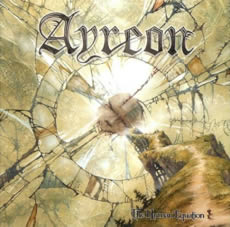
The Human Equation
Image © InsideOut Music 2004
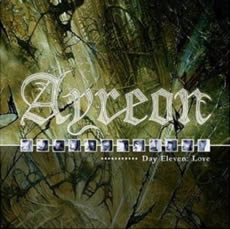
Day 11: Love
Image © InsideOut Music 2004
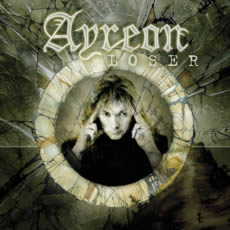
Day 16: Loser
Image © InsideOut Music 2004
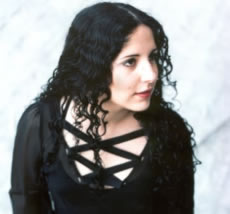
Marcela Bovio
Image © Elfonia 2004
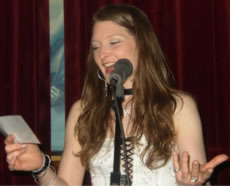
Heather Findlay
Image © Mostly Autumn 2004
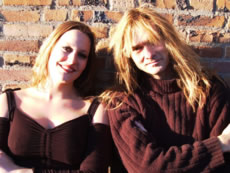
Irene Jansen | Arjen Lucassen
Image © InsideOut Music 2004
More Arjen Anthony Lucassen
Live On Earth
Space Metal
Ayreonauts Only
Flight Of The Migrator
The Dream Sequencer
Fate Of A Dreamer
|
|
(14 June 2004) Rock Operas were very much a feature of the 70s, though in recent years they have made something of a comeback in one form or other, with the likes of Clive Nolan, Oliver Wakeman and Spock’s Beard all producing story-based, multi-voiced concept albums. Perhaps the King of this sort of recording is Dutch multi-instrumentalist Arjen Lucassen, whose Ayreon project has resulted in several grandiose works of this type, featuring a multitude of guest singers and musicians, and based around his own science fiction and fantasy stories. On the The Human Equation (InsideOut Music (USA), 2004), however, Arjen has changed the pattern in two ways. First, aside from brilliant drummer Ed Warby, he has selected a totally new group of musicians and singers to work with. Second, his subject matter is more mature. He has taken a very human, personal story: a man in a coma wades his way through his memories and emotions (personified by the cast) before awaking a potentially better man. The structure and ambience of the piece place this rock opera in the same category and class as some of the better work in the 70s, especially the masterwork of the era, Andrew Lloyd Webber and Tim Rice’s Jesus Christ Superstar. For instance, there is an excellent use of singers whose voices have different tones and pitches, not to mention sexes, and the technique--developed in classical opera--of having a variety of characters swapping dialogue is extensively used to electrifying effect. Much of the singing is quite operatic, from Eric Clayton’s rich baritone as "Reason" to Magnus Ekwalls' old-fashioned rock screech as "Pride." Other singers have been chosen with care and skill. The three women involved all inhabit their characters beautifully. Heather Findlay of Mostly Autumn provides characteristic warmth to her role of "Love," while Marcela Bovio of Mexican band Elfonia brings a vulnerable sweetness to her part of "Wife." Irene Jansen (Karma), sister of Floor (After Forever), provides the power singing as "Passion." The main character of "Me" goes to the versatile James LaBrie of Dream Theatre, who brings warmth and plenty of rock power to his part, while Devin Townsend as Rage produces little symphonies in themselves in what brief moments he has. But the area where The Human Equation is streets ahead of works like Superstar, however, is in its music, and instrumentation, which is never less than astonishing, almost providing an extra character in the story. Sweeping seamlessly between melodic progressive rock, VERY heavy metal, and authentic European folk, its invention is breathtaking. Arjen himself provides the guitars, basses and warm, analogue keyboards, while a variety of other musicians provide solos, including Martin Orford of IQ, and a fluid solo reminiscent of his father from Oliver Wakeman. The folk playing is also wonderful, especially the work of Jeroen Goossens on flute. CD 1. "Day One: Vigil" begins the story atmospherically by the main character's bedside, while "Day Two: Isolation" is the album's first tour de force, introducing many of the main characters, and musical styles, from metal, ambient synths, to Heather's folky interlude, and the final Camel-like prog workout. "Day Three: Pain" broods tensely before Devin Townsend's first telling contribution on the chorus. "Day Four: Mystery" returns us to the hospital, with the music almost country-like, before exploding into another terrific piece of prog-metal. "Day Five: Voices" starts to unravel the plot, and begins with a lovely folk interlude, reminiscent of Led Zeppelin, especially with Magnus Ekwall's Plant-esque vocal. "Day Six: Childhood" uses haunting synths and strings to suggest the menace of child abuse, before the Hammond-led pop / prog of "Day Seven: Hope." "Day Eight: School" mixes gentle verses with huge, metallic choruses, while "Day Nine: Playground" is a charming progressive instrumental. "Day Ten: Memories" continues in progressive style, with a lovely melody and some great singing, especially from Heather and Marcela, not to mention some Thin Lizzy style twin guitar. "Day Eleven: Love" concludes the first CD, a terrific piece of folk / metal with the three women all featured. CD 2. The next installment commences with the crunching "Day Twelve: Trauma," starting with sinister Mellotron and deep male vocals including the excellent Mikael Akerfeldt as "Fear," before heavy guitars and Hammond take over. Back to folk again with the start of "Day Thirteen: Sign," and another vehicle for Heather and some lovely low whistle. James Labrie, Marcela--with her finest moment on the album--and Arjen himself as Best Friend take up the melody to a classical backing, before the huge, Zeppelin-like riff of "Day Fourteen: Pride." "Day Fifteen: Betrayal" is another brooding piece, but includes a wonderful prog mid-section, including Orford's solo. "Day Sixteen: Loser" commences, interestingly with didgeridoo, and features a cameo from Mike Baker of Shadow Gallery as "Father," who delivers a convincing Alice Copper impersonation--for Superstar fans, this is the equivalent of "King Herod's Song"--in a whirling folk / metal blast, which also includes a trademark Hammond solo from Ken Hensley. "Day Seventeen: Accident" commences with more analogue synths, before taking off into a great piece of Classic Rock, with Devon Graves' best moment as Agony on the chorus. "Day Eighteen: Realization" opens with yet more flute-led folk / metal strongly influenced by Spock's Beard. "Day Nineteen: Disclosure" is designed with plot-exposition in mind, though it still has a lovely chorus, before "Day Twenty: Confrontation," starting gently, builds into a huge, majestic, metallic climax with almost every character taking part. Double CDs are something of a risk. The Lamb Lies Down on Broadway by Genesis, and Snow by Spock's Beard are just two examples of fine story-driven pieces that nonetheless fail to sustain themselves at over 90 minutes. However, The Human Equation does just the opposite and without a dull minute across the epic. The story remains engaging throughout, though it is hardly original, and some of the lyrics themselves flirt with cliché, however the narrative is logical and well constructed. In fact, listeners are advised to avoid playing this album in the car for the first few listens, as it is almost impossible to hear the piece without frequent referral to the beautifully designed CD booklet. Day 11: Love. Ayreon's four-track single (InsideOut Music (Germany), 2004) accompanies the three versions of the double album. Ayreon can always be counted on singles containing bonus material. This one includes the two non-album tracks: "No Quarter" with vocals by Devon Graves, Magnus Ekwall, Eric Clayton and James LaBrie and "Space Oddity" with vocals by Eric Clayton. The latter had been covered by Ayreon earlier. A radio edit of "Day Eleven: Love" and the album version of "Day Two: Isolation" are also included on this single. Day 16: Loser. The second four-track single (InsideOut Music (Germany), 2004) in support of The Human Equation contains four non-album tracks. In the Star One version of "Loser" Joost van den Broek and Arjen Lucassen battle it out in a true to form keyboard vs guitar duel with electric violin from Robert Baba thrown in for good measure. Peter Vink recorded all new bass especially for the single and Ed Warby added some extra zing to his performance. The single also includes a cover of the Alice Cooper track "How You Gonna See Me Now" by Mike Baker and Arjen Lucassen, a version of "Into The Black Hole" recorded at the pre-release party and a special acoustic version of "Castle Hill" featuring Ewa Albering on flute and Dewi Kersten's on cello with vocals by Irene Jansen. Most Rock Operas have a number of recurring themes running through them. Like a film soundtrack these give pointers as to emotion and motivation amongst its characters. Significantly, The Human Equation avoids this completely: every moment is new to the work, and though this adds to the complexity it leaves us marvelling at the level of invention. Readers are urged to purchase the Special Edition, which includes an excellent one-hour DVD (order). Over the top though Ayreon will feel to some, if you can find you way past the bombast, this is an astonishing piece of work and is certainly a must-listen.--Stephen Lambe in Cheltenham, England and Russ Elliot in New York, USA Over the top though Ayreon will feel to some, if you can find you way past the bombast, this is an astonishing piece of work and is certainly a must-listen.--Stephen Lambe in Cheltenham, England and Russ Elliot in New York, USA 
|











